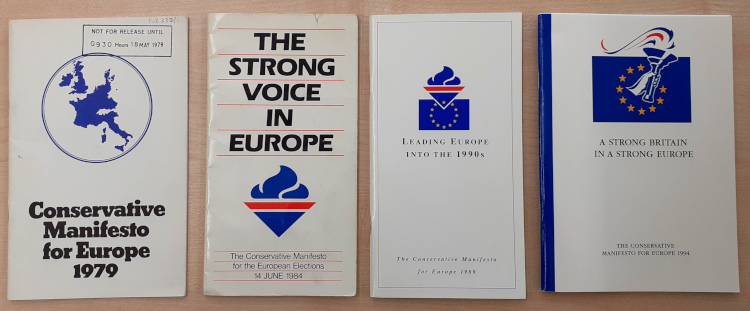
Conservative Party European Election Manifestos, 1979-1994. [Reference: CPA PUB 332/1-4].
The collection, which forms part of the Conservative Party Archive holdings at the Bodleian Library, includes public documents such as copies of the Party’s European Election manifestos, as well as published guides for Party activists and speakers. The new catalogue also incorporates our collection of historical European election addresses and ephemera, comprising printed constituency material produced both by Conservative Party candidates and by candidates from other parties.
The collection gives use an insight into how the politics of European integration changed over the course of the United Kingdom’s 47-year membership of the European Union and its predecessors. During the 1970s and the beginning of the 1980s, the Conservative Party adopted a strongly pro-European position. This can be seen in the Party’s 1984 publication Questions and Answers on Europe, produced by the Conservative Research Department for that year’s elections [CPA PUB 334/8 – pictured below]. Although stressing the need to reform the Community budget and rein in spending, Questions and Answers also champions an extension of the EEC’s role into the areas of financial services and pollution controls.

Conservative Research Department/European Democratic Group pamphlet, ‘Questions and Answers on Europe 1984’. [Reference: CPA PUB 334/8].
Thirty years later, and the evolution in the Party’s thinking can be seen clearly. The
Conservative Party European Election Manifesto 2014 (the Party’s final European manifesto, as none was produced for the 2019 elections) placed a rejection of the European Union’s status quo front-and-centre [CPA PUB 332/8 – pictured below]. Insisting that the EU was ‘too bureaucratic and too undemocratic’, Prime Minister David Cameron used the manifesto to pledge that the Party would deliver an in-out referendum on the question of Britain’s membership, setting the stage for the Brexit vote in 2016. The collection is therefore a valuable resource for researchers working on Britain’s relations with the European Union, as well as for historians of British Party politics.
![Image shows interior pages of the Conservative Party European Election Manifesto 2014. [Reference: CPA PUB 332/8].](http://blogs.bodleian.ox.ac.uk/archivesandmanuscripts/wp-content/uploads/sites/161/2020/02/PUB-332-8-last-manifesto.jpg)
Conservative Party European Election Manifesto 2014. [Reference: CPA PUB 332/8].
Also included in the updated catalogue are the Conservative Party Archive’s collections of European election addresses and ephemera. Prior to 1999, British Members of the European Parliament were elected on an individual constituency basis using the same system as in elections to the House of Commons. The election addresses of Conservative candidates therefore not only provide us with an insight into the course of specific election campaigns, but also serve as a source more generally for how MEPs sought to present their work to the wider public. The inclusion of election addresses from other parties means that the series also serves as a useful resource for the history of British politics more generally, for instance in charting the unexpected rise of the Green Party in 1989.
![Image shows the election address and campaign ephemera of Chistopher Prout, Leader of the Conservatives in the European Parliament, at the 1989 European Elections. [Reference: CPA PUB 581/3/4/7].](http://blogs.bodleian.ox.ac.uk/archivesandmanuscripts/wp-content/uploads/sites/161/2020/02/PUB-581-3-4-7-Prout-87-address.jpg)
Election address and campaign ephemera of Chistopher Prout, Leader of the Conservatives in the European Parliament, at the 1989 European Elections. [Reference: CPA PUB 581/3/4/7].
For full details of our holdings on the Conservative Party’s European Election publications, please view our online catalogue, accessible
here.
Related

![Image shows the election address and campaign ephemera of Chistopher Prout, Leader of the Conservatives in the European Parliament, at the 1989 European Elections. [Reference: CPA PUB 581/3/4/7].](http://blogs.bodleian.ox.ac.uk/archivesandmanuscripts/wp-content/uploads/sites/161/2020/02/PUB-581-3-4-7-Prout-87-address.jpg)

![Image shows interior pages of the Conservative Party European Election Manifesto 2014. [Reference: CPA PUB 332/8].](http://blogs.bodleian.ox.ac.uk/archivesandmanuscripts/wp-content/uploads/sites/161/2020/02/PUB-332-8-last-manifesto.jpg)